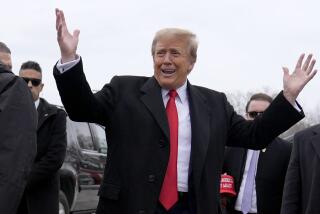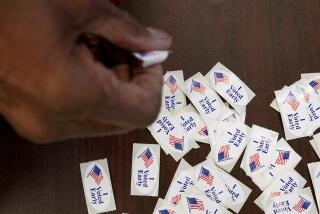A Two-Man Race Too Late for No. 2?
- Share via
WASHINGTON — With his strong showing in Wisconsin, John Edwards has finally achieved what he has sought since the Iowa caucuses: a two-man race with front-runner John F. Kerry. But Edwards may have found his lane when Kerry is too near the finish line to catch.
Edwards’ surprisingly close second-place finish on Tuesday guarantees he can continue his campaign at least through March 2, when 10 states -- including California, New York and Ohio -- will vote.
The Wisconsin results showed again that in states where Edwards has time to become known, he attracts moderates, independents and voters most concerned about the economy. And the North Carolina senator could benefit from increased media attention if Howard Dean quits the race after his distant third-place finish in Wisconsin.
But Edwards still must overcome enormous obstacles to seriously challenge Kerry who, after all, won Wisconsin and now has 15 victories in the 17 nominating contests so far.
“It’s not at all clear that this changes the central dynamic of the race, which is the inclination of Democratic voters to rally around Kerry as the presumptive nominee in the hopes of defeating President Bush,” said Democratic pollster Geoff Garin.
Also working in Kerry’s favor are the accelerated primary calendar, the breadth of support for the Massachusetts senator, the institutional party support gathering behind him and the rules of the nominating process -- which make it difficult to catch the candidate who amasses the most delegates early on.
To overcome those advantages, Edwards probably must find much more cutting arguments against Kerry than he’s unveiled so far. And even that could prove insufficient, especially because sharper attacks would provoke a backlash from some party leaders now backing Kerry.
“If Edwards actually wanted to compete for the nomination, he needed to start drawing a contrast with John Kerry a month ago,” said Steve Murphy, campaign manager for Missouri Rep. Dick Gephardt, who quit the race after finishing fourth in Iowa’s Jan. 19 caucuses. “Democrats are coalescing around John Kerry right now ... and they are eager to get onto the task of beating George Bush.”
Indeed, fully four-fifths of the voters in Wisconsin said they would be satisfied if Kerry wins the nomination, according to the exit poll conducted by the National Election Pool. Kerry demonstrated similar strength on that question in earlier contests.
That attitude underscores the largest challenge facing Edwards: identifying a constituency dissatisfied enough with Kerry to reconsider his nomination.
It’s not unusual for front-runners to hit a speed bump when they seem to have the nomination in hand: Buyer’s remorse has become a common primary phenomenon.
And candidates trying to recover from initial defeats, like Edwards, have been able to rebound only when they have been able to find arguments that shear large constituencies from the front-runner.
It’s not clear there is a significant pool of Democrats unhappy enough with Kerry to create such opportunities for Edwards. His most obvious target would seem blue-collar, non-college-educated voters sympathetic to his tough-on-trade message.
Yet targeting those voters won’t be easy with organized labor putting its shoulder behind Kerry. On Tuesday, Kerry was endorsed at a raucous rally in Milwaukee by the coalition of industrial unions that had backed Gephardt. The AFL-CIO -- the union umbrella group that is the most powerful institutional force in the Democratic Party -- will join Kerry’s forces on Thursday.
“I just don’t see an opening on the populist, labor front for John Edwards,” Murphy said. “It’s just too little, too late.”
In Wisconsin exit polling, Kerry fought Edwards to a virtual draw among the roughly three-fourths of voters who said they believed international trade had cost more jobs than it created in the state.
The survey, conducted by Edison Media Research/Mitofsky International, a cooperative arrangement among the broadcast television networks, CNN and Associated Press, sampled 2,277 voters. The margin of sampling error was plus or minus three percentage points.
Edwards’ showing among Wisconsin voters skeptical about free trade was an improvement for him; he ran behind those voters in last week’s Virginia and Tennessee primaries. That suggested Edwards benefited in Wisconsin from more explicitly highlighting his disagreement with Kerry over the North American Free Trade Agreement.
But the result also indicated that Kerry’s pledge to reassess NAFTA and toughen labor and environmental standards in future agreements may be enough to blunt Edwards’ escalating criticism.
“It’s not about what [Kerry’s] support was for NAFTA,” Leo Gerard, president of the United Steelworkers of America, said after the rally endorsing Kerry. “It’s about what he is going to do in the future.”
Among Wisconsin voters, Edwards beat Kerry by double digits among voters whose principal concern was the economy, the exit poll found. Edwards also beat Kerry by 17 percentage points among voters who said the personal quality that mattered most in their decision was finding a candidate who cared about people like them.
And while Kerry won comfortably among self-described Democrats, Edwards defeated him soundly among those who called themselves independents and Republicans (Wisconsin does not register voters by party). That result allowed Edwards to argue that the results showed he would make a stronger general election candidate.
But it’s difficult to win a party’s nomination by relying primarily on support from voters who don’t belong to it -- as Sen. John McCain of Arizona learned in the 2000 GOP race when his backing from independents and crossover Democrats was eventually overwhelmed by George W. Bush’s overwhelming advantage among Republicans.
Kerry continued to show the broad-based appeal that has characterized his dominance of the Democratic race. He ran well with liberals and tied with Edwards among moderates. His support varied only modestly between men and women.
And Kerry romped among voters who said their highest priority was finding a candidate who can beat Bush. Those voters preferred Kerry over Edwards by a ratio of more than 2 to 1.
Dean’s distant third-place finish in a state once considered among his strongest put an exclamation point on the collapse of his candidacy. Dean ran behind Kerry and Edwards even among liberals and those who said they strongly disapproved of the war in Iraq.
Perhaps the best news for Edwards in the exit poll was the finding that he soundly beat Kerry among voters who made the choice in the last week. That demonstrated Edwards’ capacity to expand his support through extensive campaigning in a single state.
But with so many states voting on March 2, Edwards will be unable to devote as much attention to any of them. His campaign’s hope is that increased media attention will compensate for that.
“Whenever you have a one-on-one kind of race, you get more attention,” said David Axelrod, a senior advisor to Edwards.
But Edwards must overcome Democratic Party rules that guarantee delegates to any candidate who wins at least 15% of the vote in a primary or caucus. That makes it difficult to catch a front-runner, so long as his support doesn’t completely collapse.
Of course, Edwards’ larger problem is that Kerry still won in Wisconsin. Always finishing second, as every Boston Red Sox fan knows, at some point looks less like a moral victory than a defeat.
(BEGIN TEXT OF INFOBOX)
Wisconsin exit poll
% of all Dem. % of votes for top candidates primary voters Kerry Edwards Dean Gender Male 48% 36% 35 19 Female 52 41% 35 17
Family income Less than $50,000 49% 42% 31 19 $50,000 or more 51 37% 38 18
Education No college degree 55% 44% 35 14 College graduate 45 33% 35 23
Party affiliation Democrat 62% 48% 31 16 Republican 9 18% 44 26 Independent/other 29 28% 40 21
Political ideology Liberal 43% 41% 30 21 Moderate 42 41% 39 13 Conservative 15 30% 37 24
When decided how to vote Today 18% 29% 40 22 In the last three days 19 22% 55 16 In the last week 21 39% 41 15 Last month/before that 42 52% 21 19
What issue mattered most in deciding vote* Economy/jobs 41% 35% 46 14 Healthcare 19 43% 30 21 Iraq war 17 44% 23 21
What one candidate quality mattered most in deciding vote** Stands up for what he believes 25% 24% 28 32 Can defeat George W. Bush 23 69% 21 8 Cares about people 19 30% 47 17 Has a positive message 17 27% 57 12
* Top three responses shown ** Top four responses shown Based on preliminary exit poll results. Numbers may not total 100% because some answer categories are not shown.
How the poll was conducted: The National Election Pool Survey contacted voters in the Wisconsin Democratic primary as they exited their polling places Tuesday. The survey includes 2,277 voters in 40 precincts. Interviews were conducted using a confidential, self-administrated questionnaire. The margin of sampling error is plus or minus 3 percentage points; for some subgroups, the margin could be somewhat higher. The survey was conducted by Edison Media Research and Mitofsky International, a cooperative arrangement among ABC News, Associated Press, CBS News, Cable News Network, Fox News and NBC News.
Source: National Election Pool Survey
More to Read
Get the L.A. Times Politics newsletter
Deeply reported insights into legislation, politics and policy from Sacramento, Washington and beyond. In your inbox twice per week.
You may occasionally receive promotional content from the Los Angeles Times.










